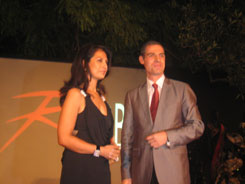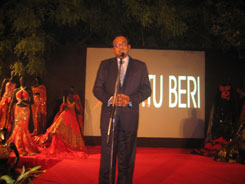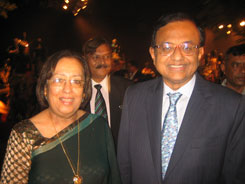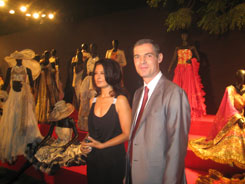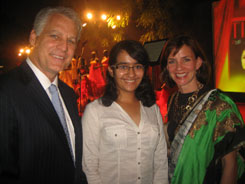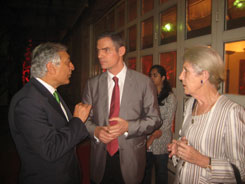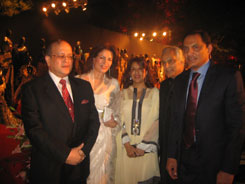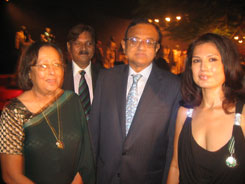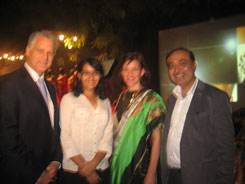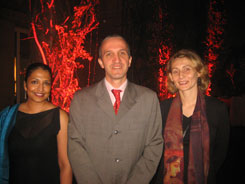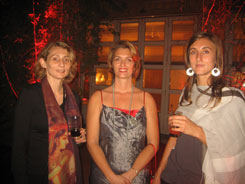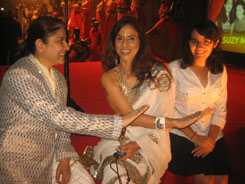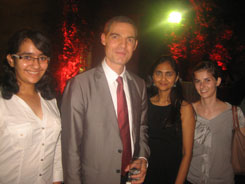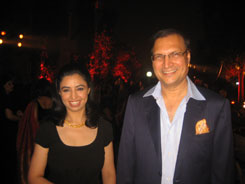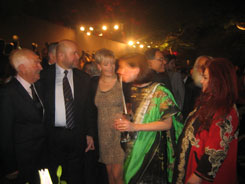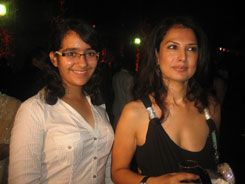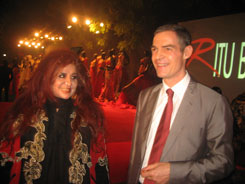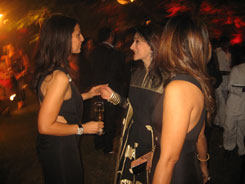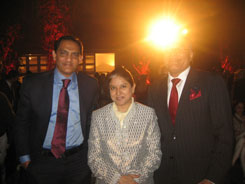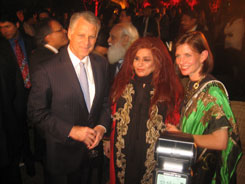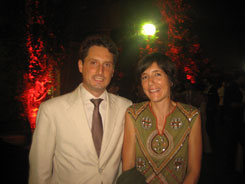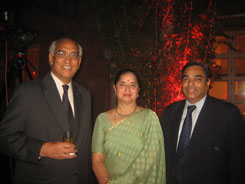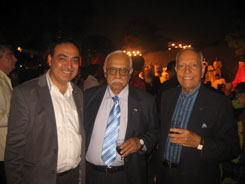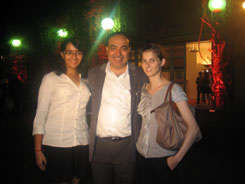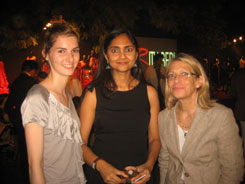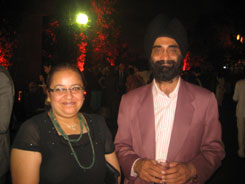
INDIA-EU
|
Supply of 'heavy' arms to Pak put on hold, France tells IndiaNEW DELHI: France has assured India it has for now put on hold supply of "heavy" military hardware to Pakistan, in the backdrop of concerns over the huge amounts of arms Pakistan is getting from the West in the name of the so-called global war on terrorism. France also made it clear that Pakistan needs to explain the questions which have arisen from Osama bin Laden's killing in the garrison town of Abbottabad, where he had been living for long under the very nose of the Pakistan Army. This came after visiting French defence minister Gerard Longuet held talks with his Indian counterpart A K Antony, who has time and again expressed the worry that a major part of the military aid Pakistan is getting from the US and other countries is being diverted to bolster its military capabilities against India. Longuet, on his part, said, "I can tell you that the military equipment which France is selling to Pakistan is only for interception and electronic purposes to fight terrorists...We have discouraged sale of heavy equipment, especially naval equipment." France, however, has supplied several major weapon systems to Pakistan, including the Agosta-90B submarines, in the past. Side-stepping questions on whether France was now reviewing this policy, Longuet said, "We are awaiting certain clarifications from Pakistan." "After the death of Osama, Pakistan should be given an opportunity to explain its position vis-a-vis terrorism," he said, adding that "terror cannot be a weapon of anybody or any government" on being asked about reports detailing ISI's role in the 26/11 terror strikes in Mumbai. Underlining that India was "a strategic partner" of France, Longuet said the armies of the two countries would soon hold a joint combat exercise called "Shakti". The two navies and air forces already conduct the 'Varuna' and 'Garuda' series of exercises relatively regularly. As reported earlier, after the ongoing Rs 23,562-crore Scorpene submarine project underway at Mazagon Docks, France is eyeing two other major Indian defence projects. While the first is the almost-finalised Rs 11,000-crore upgrade of the 52 Mirage-2000 multi-role fighters in IAF's combat fleet, the other is the Rs 42,000-crore project to supply 126 medium multi-role combat aircraft (MMRCA). With the American F/A-18 'Super Hornet' and F-16 'Super Viper', Swedish Gripen (Saab), and Russian MiG-35 (United Aircraft Corporation) ejected out of the MMRCA race, the only contenders left in the fray now are the French Rafale and the Eurofighter Typhoon. "The US might be sad (about its jets being eliminated) but with 50% of the world's arms market, they no doubt have other satisfactions...We have full confidence in Indian procedures," said Longuet. France to Assess Nuclear Risk and Safety MeasuresPARIS, April 1: Although France has avoided most of the global anti-nuclear backlash prompted by the Fukushima reactor crisis, there is a serious, if quiet, reassessing of the risks here in a country that obtains nearly 80 percent of its electricity from nuclear power. Even though there is little talk about shifting away from the industry, comments this week by top French officials made it clear that there would be changes here that were likely to have an effect on the worldwide reckoning with nuclear power, given France’s long history with the industry. The head of France’s Nuclear Safety Authority, André-Claude Lacoste, made some of that process public on Wednesday when he told members of Parliament that the country would draw the necessary lessons from the Japanese experience and upgrade safety procedures. The most urgent task — and one that Mr. Lacoste acknowledged had been neglected — is a re-evaluation of the potential effects of natural disasters on nuclear safety. “Nobody can guarantee that there will never be a nuclear accident in France,” he warned. President Nicolas Sarkozy underscored the point on Thursday, when he traveled to Japan and called for new nuclear safety guidelines for all countries in the Group of 20, over which he currently presides. “Japan is not alone,” said Mr. Sarkozy, who was the first foreign leader to visit Japan since the March 11 earthquake and tsunami devastated the coast north of Tokyo and set off the crisis at the Fukushima Daiichi Nuclear Power Station. He said global nuclear regulators, who are to gather under the auspices of the International Atomic Energy Agency in June, should meet earlier, in May, to discuss the implications of the Japanese crisis. In Mr. Lacoste’s testimony, he said that the fact that more than one natural disaster could occur at the same time, as happened in Japan, “is a subject that until now we didn’t really take into account.” He promised to take a fresh look at the risk that tectonic activity could produce on French territory, particularly along the coast. Even though France’s nuclear reactors were built to withstand five times the impact of the worst earthquake ever registered here, severe flooding and bad weather in recent years have made clear that threats can come from multiple sources, and maybe amplify each other, Mr. Lacoste said. “Climate change is changing the situation,” he said. “Extreme events that so far happened every thousand years along the coast now happen every hundred years.” Prime Minister François Fillon last month ordered a safety audit of the country’s 58 nuclear power plants. Nuclear experts are also to review a decision to keep a number of plants older than 30 years running and are cooperating with the Interior Ministry to update accident management and evacuation procedures, particularly in heavily populated areas around reactor clusters like those near Dunkerque, in northern France. Finally, Mr. Lacoste said, cooling mechanisms will be studied in more detail, not least because of their failure at Fukushima. France’s early caution in the Japanese crisis drew attention, particularly as it became the first country to advise its citizens to leave Tokyo and provided planes to repatriate those unable or unwilling to travel south, just days after the earthquake struck. Many countries eventually followed suit. The recommendation was the result of nuclear experts at the Japanese subsidiary of Areva, the state-controlled French nuclear company, warning the French ambassador about a potential risk of contamination in Tokyo if the wind turned and rain then deposited radioactivity from the damaged reactors in the capital. Whatever traces the current crisis might leave, France is unlikely to entirely turn its back on nuclear power, a legacy of Charles de Gaulle that has been broadly embraced by politicians across the political mainstream for decades. The nuclear industry in France is highly advanced and provides a major source of export revenue. Three partially state-owned French companies — Areva, GDF Suez and EDF — are among the most important players in the sector globally. EDF designs, maintains, operates and decommissions plants. In 2008, France produced 439 terawatt hours of nuclear power, representing 16 percent of global production. Curb terrorism, Sarkozy tells Pakistan
Speaking in French,Sarkozy said "The Mumbai attack proved one more time that terrorism is nothing but criminal activity. It pretends to act for political or religious objectives, but it is just savagery. It pretends to serve ideals but it injures them through its acts." In his 20-minute speech, he said, "It is unacceptable that India's security can be threatened by terrorists acting from neighbouring countries. It is unacceptable for Afghanistan and for our troops that the Taliban and al-Qaida find safe haven in the border regions of Pakistan. We know the price that the Pakistani people are paying for terrorism, but it is unacceptable for the world that terrorist acts should be masterminded and carried out by terrorist groups in Pakistan... I call on all Pakistani authorities to step up their efforts and show that they are resolute in combating these criminals." Fifty-five-year-old Sarkozy, who is of Hungarian descent, and his 43-year-old Italian-born wife, Carla Bruni, a supermodel and singer, arrived in Mumbai from New Delhi at 11.15am on the last leg of their four-day visit to India. The first couple were aptly dressed for the ensuing 26/11 tributes as well as the business-trade summit, having picked sober colours from their wardrobes. The President wore a dark-grey suit, sky-blue shirt and navy-blue tie, while Bruni, heiress of the CEAT empire, complemented him by wearing a white half-sleeved top and black trousers with black shoes to go. Her hair was pinned back in a formal bun. Upon arrival, the dignitaries were led to the martyrs' memorial at Police Gymkhana where Sarkozy placed a wreath prepared in the colours of the French flag. Shortly after, he left for Trident hotel, where he made the most fiery speech of his Indian tour. What was expected to be a brief formal statement condemning the Mumbai attacks turned out to be an emotional show of solidarity with a martyred city that awaits justice. Unlike the tactful phrases employed by Obama, Sarkozy cut to the chase. Mincing no words, he likened 26/11 to America's 9/11 and berated Pakistan for continuing to remain a safe haven for the Taliban and al-Qaida. Promising India total, unrestricted cooperation of the French government, the head of state complimented PM Manmohan Singh for the remarkable restraint he had shown in aftermath. "There will be no limit to the operational cooperation that India will receive in its counter-terrorism operations," he said. However, he cautioned that resorting to inhumane methods to arrest extremists would mean falling into the terrorists' trap, and asked countries to also curb injustice so that educated, qualified youths do not fall prey to false ideals. Given that France is fighting its own battle with Islamist terror, the President recalled that his own fellow citizens were martyred in the Mumbai attacks. "France itself has been menaced and blackmailed by Islamist terrorists to whom it may not give in. France has intensified its efforts to eradicate terrorism," Sarkozy said. He also said that France valued its relations with Pakistan. A Pakistan which is democratic, stable and prosperous is in the interest of this region and the world, Sarkozy said. As a corollary to his sharp statement against terror, Sarkozy conferred medals of honour on Devendra Bharma, executive vice-president of the Oberoi, and Karambir Kang, former general manager of the Taj, for their bravery in helping hotel guests escape during the 26/11 siege. "You were there day and night, making decisions even at the cost of your own lives," he told them. Some of Mumbai's other heroes, like CST announcer Vishnu Zende as well as RPF inspector Jillu Yadav, were also invited to the ceremony, as was Kavita Karkare, widow of slain ATS chief Hemant Karkare. Sarkozy shook hands with some of them as he departed. Sarkozy condemns Pakistan terror 'safe havens'
"It is unacceptable... that terrorist acts should be masterminded and carried out by terrorist groups in Pakistan," Sarkozy said in Mumbai on the final day of his four-day trip to India. "I call on all Pakistani authorities to step up their efforts and show that they are resolute in combating these criminals." Sarkozy on Tuesday paid tributes to the 26/11 martyrs at the Police Memorial dedicated to security men killed during the November 2008 attacks in Mumbai. Accompanied by wife Carla Bruni and other French officials, the President laid a wreath in memory of those security personnel who died fighting terrorists in the Mumbai siege.
DGP Sivanandan, Mumbai Police Commissioner Sanjeev Dayal were among the top police officials present on the occasion. 166 people were killed by ten terrorists who stormed South Mumbai late on November 26, 2008, targeting a pub, two luxury hotels, the country’s oldest and biggest railway terminus (CST), a Jewish centre and a hospital, among others. India to become Permanent Member of UNSC in two years: SarkozyBy Deepak Arora
Addressing a joint press conference with Indian Prime Minister Manmohan Singh here on Monday, Sarkozy said that India as a permanent member of the United Nations Security Council was important for the "equilibrium of the world". The French President said "it is not just an important matter for India but for the equilibrium of the world." In the same breath, he asked "After its two-year term, are we going to ask India simply to stand down." He was referring to India becoming a non-permanent member of the Security Council from January 1, 2011.
In his opening remarks, Manmohan Singh thanked France for being a "consistent advocate" of India's candidature for a permanent Security Council seat. The high-profile Sarkozy visit also saw the two countries signing signing seven agreements, including one for setting up of a nuclear plant in Maharashtra, the first such pact after the end of New Delhi's isolation in the nuclear field. Prime Minister Manmohan Singh and French President Nicolas Sarkozy also decided to work for doubling bilateral trade to 12 billion Euros by 2012, much of which is expected to be propelled by enhanced cooperation in the fields of civil nuclear energy and civil aviation.
After the talks, the two sides signed seven pacts, five of them in civil nuclear field and one each for co-production of films and cooperation in the Earth System Science and Climate.
The General Framework Agreement for building the European Pressure Reactors (EPF) was signed between the Nuclear Power Corporation of India Limited (NPCIL) and French company, Areva. The plant, which is intended to have six reactors in all at the cost of 25 billion dollars, will ultimately produce 10,000 MW of power.
"The framework agreement has been signed between Areva and NPCIL. There are issues with regard to other technical matters including pricing. These are subject matter of negotiations," said Manmohan Singh. While noting that India's current nuclear power generation capacity is 4000 MW, Singh said setting up of the plant with the help of Areva will go a long way in enhancing the country's electricity production. The other pacts signed in the civil nuclear field include Early Works Agreement between NPCIL and AREVA for Implementation of EPR units at Jaitapur.
Calling upon Pakistan to fight terrorism with determination, the French President on Monday appreciated India's efforts to "stretch out its hand" towards its South Asian neighbour. "We applaud India's effort to stretch out its hand. We call upon Pakistan to fight terrorism determinedly," said Sarkozy. He pointed out that France had stood "shoulder-to-shoulder" with India in the aftermath of the 2008 Mumbai terror attack in which two French officials had also died. They were among the 166 victims. "Our cooperation on counter-terrorism is without limits," said Sarkozy. He said he appreciated Manmohan Singh's effort to reach out to Pakistan, despite the Indian public opinion being "deeply shocked and traumatised" by the terror savagery. Sarkozy said that in the 21st century, the only way to ensure peace and security was to "develop together and not against another", making a reference to the European Union, where former foes now work together. The president said both France and India have the "same reading on Afghanistan". An agreement for cooperation between the Department of Atomic Energy and Commissariat a l'energie Atomique et aAux Energies Alternatives in the field of Nuclear Science and Technology for Peaceful Uses of Nuclear Energy was also signed. The two sides also inked two agreements. One, pertaining to Protection of Confidentiality of Technical Data and Information Relating to Cooperation in Peaceful Uses of Nuclear Energy and the other was concerning Intellectual Property Rights on the Development of Peaceful Uses of Nuclear Energy. Describing France as India's "most important and reliable defence partner", the Prime Minister appreciated Paris' willingness to supply advanced defence technologies to contribute to the modernisation of this industry. A Joint Statement, issued after the talks, identified counter-terrorism as a significant area of cooperation where the two sides are making good progress. The two sides also decided to work together in the international bodies to counter financing of terrorism and money-laundering. "With the French Presidency of the G-20 which has just started, India's dual participation in the G-20 and the Security Council for the 2010/2011 time-frame present a historic opportunity to step up joint work in these two bodies," the statement said. The two sides affirmed their wish to continue and expand their dialogue and concrete cooperation in multilateral bodies, especially in UNSC during 2010-11 to address threats such as regional crises, terrorism, climate change and proliferation of weapons of mass destruction and their delivery systems, as well as to promote arms control and global disarmament. France committed to jointly work with India towards India's increased participation with international non-proliferation initiatives and full membership of multilateral export control regimes like NSG, Missile Technology Control Regime (MTCR) and Australia Group "in a manner consistent with procedures and objectives of these groups". The two countries reiterated their support to starting immediate negotiations in the Conference of Disarmament for multilateral treaty banning the production of fissile material for use in nuclear weapons or other nuclear explosive devices. The two leaders welcomed the ongoing efforts and future prospects for joint programmes in defence industry, which would include joint research and development and transfer of technology. As a first step in this regard, the two sides expect to launch soon the programme for development of Short-Range Surface-to-Air Missiles and Kaveri engines for India's Light Combat Aircraft. Discussions concerning the upgrading of Mirage 2000 aircraft are expected to be finalised soon, it said. With regard to tensions on the Korean peninsula, the two leaders expressed concern about the situation there and urged North Korea to comply with UNSC and IAEA Board of Governors resolutions. On Iran, the two sides affirmed their commitment to resolve the nuclear issue and discussed the need for Tehran to take constructive and immediate steps to meet its obligations to the IAEA and the UNSC. Carla Bruni promises to raise rights of HIV patients
Ms. Bruni also assured them that the issues concerning their rights and well-being would be raised by her at world fora including the European Commission. Ms. Bruni, who reportedly lost her brother to HIV-related complications in 2006, is the ambassador for Geneva-based Global Fund that invests in fight against AIDS, Tuberculosis and Malaria. “I understand. Yes, I will,” she told activists from the NAZ Foundation, an outfit fighting for HIV positive and Gay rights, who wanted her to raise with the European Commission (EC) their stand disallowing generic medicines from India to be exported to their nations for treating HIV positives. NAZ Foundation’s executive director Anjali Gopalan brought the issue to Ms. Bruni’s notice and her concern over the EC stand was also voiced by Global Fund Executive Director Prof Michel Kazatchkine, who accompanied the French First Lady during the visits. As part of her campaign for prevention of HIV/AIDS and promoting related programmes, she went around the capital’s Safdarjung Hospital, which runs a programme for HIV positive pregnant women and appreciated the “courage” shown by the patients there in ensuring that their children are free of the debilitating virus. “It is very courageous. She will have a healthy baby. She is very courageous to do that,” Ms. Bruni told the hospital’s doctors after interacting with a migrant labourer’s wife from Uttarakhand, who was found to be HIV positive during her pre-natal tests. The First Lady was taken around the wards, where the hospital provides services for preventing parent-to-child HIV transmission integrated with general patient care and maternal health, by National Aids Control Organisation (NACO) Joint Secretary Aradhana Johri and hospital Medical Superintendent Dr. N. K. Mohanty. She later told waiting reporters that the “prevention of transmission of AIDS is one of the most important fights that humanity has to face. I am taking care, in particular, the prevention of transmission from mother to the child. Because, of course, AIDS does not concern the minority, but concerns everyone of us.” Referring to her interaction with the HIV positive pregnant women, she said, “They can come here and I think it is a great achievement that the doctors and the nurses are doing here.” “Because pregnant women can get tested here and often they accept the tests for their baby so they can be treated for being HIV positive and their baby will be born healthy.” On why it is important for her to take up this campaign, Ms. Bruni quipped, “Isn’t it evident?” But, she stressed that “it is important for babies to be born HIV-free.” “Since we have the drugs that the Global Fund can bring to every country, my job is to talk about it and to say to every mother to go to the hospital, get tested and it is not a trauma, it is just a disease and it is not a malediction and your child will be healthy and you can take care of your family as well,” she added. The First Lady was asked by one of the children at the care home what she thought of India. “I love India. This time, I am here for only four days. But next time, I will be here for four weeks,” she said. The children sang songs, both in English and Hindi, for her and presented her and Kazatchkine with paintings that they had made specially for the occasion. “You all look very happy, healthy, loved and educated,” Ms. Bruni told them. Asked to sing a song from her coming album, the First Lady said, it will come out in 2012 and that she would sing for them the next time she was there at their care home. French companies commit euro 10 b investment in India
Seeking to boost its investments in India, France on Monday announced that its companies would invest nearly 10 billion euro (about Rs. 720 crore) by 2012. It promised the inflows to be even better if multi-brand retail and insurance sectors were liberalised. Speaking at the Indo-France Business Forum organised by the Federation of Indian Chambers of Commerce and Industry (FICCI) here, French Finance Minister Christine Lagarde, who is part of President Nicolas Sarkozy's entourage, said: “The 10-billion euro commitment by French businesses to invest in India between 2008 and 2012, could be a lot more if opportunities come up by the opening of insurance and multi brand retail. French companies would respond in a rigorous manner. Everything is about give and take, it's a two-way street.” Ms. Lagarde suggested that in order to ensure that the margins of the big retailers were not excessive, a process of consultation and dialogue could be initiated by the government with retailers. Allaying fears on the stability of Euro zone, Ms. Lagarde said that the European Union would defend the European financial alliance and would certainly not give up the euro. “We have put together a $1,000 billion European Fund (which includes the European contribution and IMF assistance) to bail out any EU member state that is in difficulty,” she said. Responding to the remarks by the French Finance Minister, Planning Commission Deputy Chairman Montek Singh Ahluwalia said liberalisation of the two sectors was very much on government's agenda but the policy has to be calibrated. “Relaxation of FDI cap on insurance and multi-brand retail is very much on the agenda. As far as insurance is concerned, the government has initiated the Parliamentary process to create a legislation to go in for 49 per cent FDI in the sector,” he said. At present FDI up to 26 per cent is allowed in the insurance sector. On FDI in multi-brand retail, Dr. Ahluwalia said, several ministries have supported the proposal for allowing FDI in the sector. The government has already put out a discussion paper on the politically sensitive subject. A joint statement issued after talks between the Prime Minister, Manmohan Singh, and Mr. Sarkozy, said that the two governments were committed to more than doubling their trade by 2012 to 12 billion euro from 5 billion euro in 2008. The areas of investment and trade include automobiles, electrical equipment, rail transport and water utilities. It said France and India recognised the importance of agriculture and food processing sector for ensuring affordable food production in both the countries. PM hosts dinner for Sarkozy, allays N-liability concerns
Sarkozy flew in here from Agra Sunday evening after a four-hour stop in Bangalore Saturday. Manmohan Singh and Sarkozy, who have met several times in the last three years and enjoy a good rapport, held one-on-one talks for nearly half-an-hour before they joined the rest for a private dinner. Senior French ministers, including foreign minister Michele Alliot-Marie, defence minister Alain Juppe and finance minister Christine Lagarde, were present at the dinner. From the Indian side, UPA Chairperson Sonia Gandhi, External Affairs Minister S M Krishna, Defence Minister A K Antony, Lok Sabha Speaker Meira Kumar, Leader of Opposition Sushma Sawaraj, National Security Adviser Shivshankar Menon and Foreign Secretary Nirupama Rao were among those present at the meeting. Sarkozy spoke about taking civil nuclear cooperation to new heights, but voiced concerns of French nuclear giants like Areva about some aspects of the civil nuclear liability law, according to sources. He also spoke about the need for India to bring its liability rules and procedures in line with international regulations like the Vienna convention, added the sources. The two leaders also shared views a host of global issues like reform of the international financial institutions, climate change and non-proliferation. In particular, Sarkozy, whose country is the chair of the G20 summit of major and emerging economies, sought India's support for key goals of the French presidency of the G20 grouping. Manmohan Singh, on his part, thanked the French leader for championing nuclear energy for India and his support, articulated in Bangalore, for New Delhi's membership of elite nuclear clubs like the Nuclear Suppliers Group, the sources said. The prime minister also allayed France's concerns over India's passage of a civil nuclear liability law, and spoke about the country's ambitious plan for expanding nuclear energy production. With this assurance, there is a stronger possibility of a framework civil nuclear cooperation agreement being signed between Areva and the Nuclear Power Corporation of India Limited (NPCIL) for building two European Pressurised Reactors, the sources said. The framework accord is expected to lay down the broad rules for Areva building two nuclear reactors initially, which will eventually increase to six in number. Areva plans to set up two atomic power plants of 1,650 MW capacity each at Jaitapur in Maharashtra. Areva has made it clear that it is awaiting notification of implementing rules of the nuclear liability law to know the extent of the compensation they will have to pay in case of an atomic accident in facilities set up by it. Carla talks HIV patients' rights with Sonia
Bruni, who was asked about her meeting with Gandhi, told reporters here today that she had spoken to her about the global movement for prevention of HIV transmission and the rights of AIDS patients. However, Bruni did not say what Gandhi's response was on her mentioning of the movement financed worldwide by Global Fund of which the French First Lady is the Ambassador. Bruni said she also loved her visits to Bangalore and Agra where she and her husband Nicolas Sarkozy spent considerable at the Taj Mahal. Sarkozy endorses India’s entry in Nuclear Suppliers GroupBy Deepak Arora
Speaking at the Indian Space Research Organisation (ISRO) Satellite Centre here on Saturday, Sarkozy said India had already signed agreements with France, United States, Russia and United Kingdom and others would be joining soon. “That’s why it makes sense for India to participate fully in the work of multilateral bodies responsible for drafting and ensuing compliance with the non-proliferation group, starting with the NSG. France supports India’s candidacy to join these groups,” he said. Calling for an end to India’s nuclear isolation, he said France knew how critical it was for India to ensure its energy security. He also spoke about starting research, training and plant safety programmes as a result of the bilateral agreement signed in September 2008. “When this phase is completed, the six Indo-French European Pressurised Reactors (EPR) will provide 10,000 MW of non-polluting energy to the Indian economy, to the maximum benefit of manufacturing facilities and French and Indian workers.”
India's recent election to the Security Council for two years “must serve as the prelude to a permanent Indian presence within the UNSC,” Mr. Sarkozy said. The UNSC must be expanded to include new permanent members — India, Brazil, Germany and Japan — and must have representation from Africa and the Middle-East, he said, adding India should join the Security Council as a permanent member so that it can assume its full role in the G20. Speaking of France's relationship with India, Sarkozy said that his country has been a good friend of India. "We don't speak in two languages. We mean what we say." Condemning the 26/11 attacks, he said any such strike on India was an attack on democracy and all democracies stand by India. "When India is attacked, it is democracy attacked," he said. He observed that terrorism emanating from Pakistan and Afghanistan is a "major source of instability" in the world. Talking about Afghanistan, he praised India's role and said the world cannot afford to lose the war against Taliban. "We cannot afford to allow Taliban to comeback. No one stands benefited if civil war raises its ugly head...we must succeed," he said. Sarkozy showered praise on Prime Minister Manmohan Singh saying the Indian leader was obsessed with peace through development and eradication of poverty. "I have great admiration for Prime Minister Singh. I value his friendship. He is right in believing in peace and stability. India's challenge is that if you succeed through peace, it will have a huge knock-out effect on the world," he said. India and France are united by common values and believe that international relations should not be governed by brutality or force and it should be based on dialogue and rule of law, Sarkozy said adding the relationship between the two countries should go much further. On the Indo-French space collaboration, Sarkozy said India and France had to work together as “we refuse to allow space adventure to ever become a monopoly of just one or two states”. He also touched upon the international financial crisis and global greenhouse gas emissions. France hoped to take in three times the number of Indian students in its universities by 2012 compared to 2007, he said. “France wishes to expand ties with Indian universities, and wants to host more Indian students.” Sarkozy, who is visiting India for the second time in three years, was accompanied by his wife Carla Bruni, ministers and officials. The French first couple, whose only stop was ISRO in Bangalore, flew to Agra in the afternoon for a private visit to the Taj Mahal, the famed white marble monument to love. Sarkozy has come on a four-day visit to India and is accompanied by seven Ministers including Defense, Foreign and Finance ministers and nearly 60 CEOs of French companies. He will arrive in New Delhi on Sunday and in the evening Prime Minister Manmohan Singh will host a private dinner in his honour. He will be holding formal talks with Prime Minister Manmohan Singh in New Delhi on Monday. Sarkozy, Carla Bruni Visit Monument of Love -- Taj MahalAGRA, Dec 4: French President Nicolas Sarkozy and his wife Carla Bruni on Saturday got a splendid view of the Taj Mahal, which they visited in the evening. The Taj Mahal is the 17th century monument of love and this is what brought the French First Couple to this small yet bustling city. Sarkozy, dressed in a dark smart suit, and Bruni in a black short dress wrapped in a light coloured stole visited the Taj this evening to catch a glimpse of the beautiful sunset. The French First Couple also experienced a great view of the Taj Mahal from Amarvilas Hotel where they are staying. The hotel is located 600 metres from the Taj Mahal and offers a splendid view of the monument of love. ISRO hands 2 contracts to Arianespace, renews deal with EADS
This was announced during the visit of French President Nilolas Sarkozy in Bangalore on Saturday. "We have signed commercial agreements with Arianespace for two more launches -- GSAT-8 in 2011 and GSAT-10 in 2012," ISRO Chairman K Radhakrishnan said. He did not specify the contract value but ISRO sources said launch cost of each satellite is around Rs 250 crore. Radhakrishnan said Arianespace, the European launcher which operates from France's territory of Altantic coast in South America, has so far launched 12 Indian satellites. He also announced that a strategic alliance signed between EADS Astrium, Europe's leading satellite system specialist, and ISRO in 2005 was renewed on Saturday for another five years. Under the alliance,ISRO's commercial arm Antrix Corporation Limited and EADS Astrium, wholly owned subsidiary of EADS SPACE, will jointly address the commercial market for communications satellites with payload power below 4 Kw and a launch mass in the range of two to three tons. Satellites in this segment represent a sizeable and stable part of the market. The aim of this cooperation is to optimise INSAT 2K and 3K Platforms along with EADS Astrium payloads. Radhakrishnan said Megha-Tropiques and SARAL satellites, being jointly developed by ISRO and its French counterpart CNES, would be launched in May and December 2011 respectively, as he recalled the "rich legacy of cooperation and collaborations" between the two space agencies since 1972. ISRO and CNES would continue to work together and explore new domains, including climate change and other frontier areas he said and told the French President: "Your visit to ISRO inspires both space agencies to look forward to and to look beyond with synergy". ISRO sources said Sarkozy and his wife Carla Bruni were shown an exhibition put up at the ISRO Satellite Centre, where they also viewed the Megha-Tropique satellite being developed in a clean-room. Sarkozy visit to give further impetus to Indo-French strategic partnershipBy Deepak Arora
Sarkozy, who will be paying a working visit to India from December 4 to 7 at the invitation of Prime Minister Dr. Manmohan Singh, will be accompanied by his wife, Carla Sarkozy, a high-level delegation including several key Ministers of his Cabinet, senior officials, business-persons and media. India and France share a strategic partnership forged in 1998. In recent years, this partnership has scaled new heights through high-level exchanges and consultations. India-France relations are broad-based and include important areas such as, civil nuclear cooperation, space, defence, trade & investment, science & technology and cultural exchanges. The French President will visit the Indian Space Research Organisation (ISRO) in Bengaluru when he arrives in India on December 4. During his four-day visit, both countries are likely to further increase cooperation in civil nuclear energy sector. Sarkozy, Bruni to visit Taj
The substantive part of the visit will be on December 6 when he reaches New Delhi to hold delegation-level talks with Prime Minister Manmohan Singh. In New Delhi, the French President will call on President Pratibha Patil. He will also travel to Mumbai on December 7 where the French President will visit the 26/11 police memorial on Marine Drive. He would also attend a function where awards will be given to the management of Taj Mahal Palace and Oberoi-Trident hotels for their support to French nationals during 26/11. He will also participate in a business conference and meet captains of Indian industry. Sarkozy is set to be the first foreign leader at the police memorial. The police had requested the state to arrange a visit in US President Barack Obama’s itinerary too, but that was turned down. Top Mumbai Police officers will meet a French delegation Wednesday to lay the groundwork for Sarkozy’s visit. “We will meet French officials tomorrow to discuss the itinerary. We will then begin making the necessary arrangements,” said Commissioner of Police Sanjeev Dayal. Britain backs India’s UNSC campaignSEOUL, Nov 12: Britain on Thursday extended its support to India in its campaign for becoming a permanent member of the United Nations Security Council, a move that comes close on the heels of a U.S. backing. The support came at a meeting between Prime Minister Manmohan Singh and his British counterpart David Cameron at a meeting in Seoul on the margins of the G20 summit. External Affairs ministry spokesman Vishnu Prakash, briefing reporters on the meeting, recalled that Britain had earlier supported India’s case for non-permanent membership of the UNSC. The Prime Minister and Mr. Cameron had been meeting regularly even before the latter’s state visit to India recently. The two had met in Toronto in June after his election as Prime Minister of Britain and in 2006 when he had come to New Delhi after his election as leader of the opposition. The spokesman said the two countries shared a strategic partnership from 2004 which was converted into an enhanced partnership during Cameron’s visit in July. The U.K. has been India’s major trading partner with trade at $11 billion and British investment in India placed at $6 billion. Britain is the fourth largest investor in India. The India-U.K. CEO’s forum, co-chaired by Ratan Tata and Peter Sands, Chairman of the Standard Chartered Bank, has been activated and it formed the bed rock of the bilateral economic relationship. The Prime Minister also met his Ethiopian counterpart Meles Zanawi and Mexican President Felipe Calderon. Mr. Zenawi was appreciative of the excellent support India gave in the area of hi-tech programme as New Delhi proposed to set up a vocational training institute in Ethiopia. Top French honour for Hariprasad Chaurasia
Conferring the highest civilian award in France to the 72-year-old flutist, Ambassador Bonnafont said Pt. Chaurasia’s has been honoured for his contribution towards the spread of Indian classical music in France and all over the world. Classical flute exponent Hariprasad Chaurasia will be conferred the Chevalier dans l’Ordre des Arts et des Lettres, the highest civilian award in France, by the French government for his contribution to music on November 9. A book and a CD set “Hariprasad Chaurasia and the Art of Improvisation” by Henri Tournier, the flute maestro’s French assistant at the Rotterdam Music Conservatory, was also presented at the award ceremony.
The book offers a discovery of Chaurasia’s “extraordinary mastery of improvisation” and also aims to guide scholars, performers and composers endeavouring to explore his music. Works by artist Sujata Bajaj, whose paintings appear in this book, were also on display. The award ceremony was preceded by a bansuri concert by Pt. Hariprasad Chaurasia and his musicians in a traditional baithak atmosphere. Over a lifetime of performances, Pandit Hariprasad Chaurasia has been honoured with several distinctions, including the national Sangeet Natak Academy award and the Padma Vibhushan. He has collaborated with many Western artists and composed music for a number of Indian films.
The French government distinction Chevalier dans l’Ordre des Arts et des Lettres (Knight of the Order of Arts and Letters) is conferred on “persons who have distinguished themselves by their creativity in the field of art, culture and literature or for their contribution to the influence of arts in France and throughout the world.” Some noted Indian recipients of this honour in the past include photographer Raghu Rai, the late theatre personality Habib Tanveer, writer Upamanyu Chatterjee and fashion designer Ritu Beri. Sarkozy blasts 'scandal' over Africa's place at UNMONTREUX, Switzerland, Oct 23: French President Nicolas Sarkozy said on Saturday that it was a "scandal" that Africa was not given a permanent seat on the UN Security Council as he outlined his aims for France's presidency of the G20 and G8 nations. Sarkozy also supported places for India, South America and economic powers Japan and Germany on the UN's powerful decision-making body, and vowed to begin tackling reform of the international monetary system. "We are in the 21st century, we are no longer in the 20th century," Sarkozy said, outlining the need for major changes to international political and economic governance at the opening of the 13th summit of francophone nations. Sarkozy told the 37 other heads of state and government that he wanted to deal with three major issues when France takes over the helm of the Group of 20 rich and emerging nations on November 12, and the Group of Eight industrialised nations next year. They included a multilateral approach to the monetary system, volatile commodity prices and transparency in oil markets, as well as broadening the UN Security Council to developing nations and other economic powers. The French leader questioned whether it was normal that there was "no permanent member of the Security Council from Africa". "One billion inhabitants, in 30 years two billion inhabitants who have no permanent representation -- it's a scandal," he exclaimed, also underlining the legitimacy of a place for India as one of the world's most populous nations. Senegal's President Abdoulaye Wade told journalists: "A historic error needs to be repaired." But Wade cautioned that an African country that took up a Security Council seat with the veto right "must be a good advocate for Africa" as whole and should not believe that it represented itself. Sarkozy also highlighted the need to continue to modernise world monetary and economic affairs, criticising a monetary system that dated back to the 1940s when there was "fundamentally a single currency and one major economy". He underlined that world leaders appeared "unable to define a multilateral system". "France proposes to begin the debate on the international monetary system without taboos," the French president added, also criticising "the extravagant volatility of commodity prices" including food. G20 finance ministers who vowed to avoid tit-for-tat currency devaluations on Saturday forged an agreement in South Korea to "refrain from competitive devaluation of currencies". In the Swiss town of Montreux, Abdou Diouf, the former Senegalese president who heads the International Organisation of Francophonie, said Africa was "underrepresented in bodies where decisions are taken that concern it directly". African nations form 27 percent of the UN membership. Diouf's Francophonie mandate was expected to be extended on Sunday, the last day of the summit. The 40-year-old International Organisation of the Francophonie brings together 56 member states and 14 observer nations, 40 percent of them from Africa. Swiss President Doris Leuthard opened the summit with an appeal for the "rapid restoration of the rule of law" in Guinea and Madagascar, which are currently suspended from the Francophonie. "Coups and Francophonie have become incompatible," Leuthard underlined. The two-day summit is also expected to deal with food security, and environmental issues, as well as the post-earthquake reconstruction of Haiti. Canada's Prime Minister Stephen Harper vowed to keep up aid for the Caribbean nation. "Your friends from the Francophonie will never let you down," he said. Diplomats said they would try to forge a common position in Montreux on ways of fighting climate change, just over a month before crucial UN climate talks in Cancun, Mexico. Ritu Beri conferred top French civilian award
The French Government honoured Indian fashion diva Ritu Beri for her contribution towards the enrichment of the Indo-French cultural inheritance. The chief guest for the evening was union Home Minister P. Chidambaram. The glittering evening was also attended by a few Members of Parliament including Najma Heptullah and former cricketer Mohammad Azharuddin, writer-columnist Shobha De, US Ambassador Timothy Roemer and his wife, Sally, renowned beautician Shahnaz Hussain amongst others.
The Ambassador said "Ritu Beri''s association with France goes way back when she trained under the French embroidery maestro Francois Lesage. She is also one of the first South Asian women to head a French fashion house." Mr Bonnafont said that his country saw Ritu Beri as an "embodiment of haute-couture in India."
Speaking on the occasion, Union Home Minster P Chidambaram joked "my acquaintance with the fashion world is extremely limited...for the kind of clothes I usually wear I don’t require a fashion designer." He, however, added in the same breath, that the country was "very proud, very happy and delighted," for Beri’s achievements.
Ritu Beri is considered a pioneer in showcasing India-inspired motifs on the catwalks of Paris, giving Fashion connoisseurs a glimpse of India’s textile heritage, but her designs have graced the ramps in many other countries as well to wide critical acclaim. She has also earned the credit of being the first Asian designer to head the French fashion brand, Scherrer.
"I'm so overwhelmed that I could never imagine I would feel like what I'm feeling on stage today. My life has actually been a fairytale. I have always had crazy dreams. I am a huge dreamer. But this particular award was beyond my dreams. I never dreamt this could be ever possible, but it's a great honour and responsibility which I have been conferred with." Ritu, who heads French fashion brand Scherrer, said “the Indian fashion industry is young in the West but has a lot of scope to grow. We are only 20 years old and have a long way to go."
"I'm here today because I'm an Indian and because I believe in India. Everything I did across the border only reflected my love for India. And this is the only reason behind what I am today." She concluded with keeping her hopes high by saying, "This dreamer will dream on." Noted columnist and novelist Shobha De who attended the award ceremony was all praises for the fashion diva describing her as an "accomplished, beautiful and a committed" woman.
"Ritu’s relationship with France is akin to a marriage made in heaven and Indo-France relationship will be cemented by this connection." What caught one by surprise and awe as one entered the French Ambassador for the soiree was the number of mannequins that had lined up to show the creations of the Delhi-based designer. In fact, there were a total of 120 mannequins that showed her creations for the evening.
With being honoured with one of the highest civilian awards by the French government, Ritu Beri joined the elite club comprising the likes of Shahrukh Khan, Raghu Rai and the late Habib Tanveer, Upamanyu Chatterjee. Chevalier dans l'Ordre des Arts et des Lettres is one of the highest civilian awards conferred by the French government annually to those who make significant contributions to art and literature. France reiterates support for India's permanent UN seatNEW DELHI, Oct 18: France has once again reiterated its support for India's bid for a permanent seat in the United Nations Security Council, saying it supported reforming of the world body in order to strengthen it. At an interaction with reporters here, French Chief of Defence Staff Admiral Edouard Guillaud said the two countries shared 'the common view for promotion of world governance'. 'France supports the reforming of the United Nations to strengthen it. And that is why France supports India for a permanent seat in the UN,' Admiral Guillaud said on the penultimate day of his four-day India trip that ends Tuesday. French President Nicolas Sarkozy who is expected to visit India in December has been a vocal supporter of India's permanent membership in the UN Security Council. The French Chief of Defence Staff further said that President Sarkozy's visit to India in the month of December would strengthen the relationship between the two countries. "We share the same concerns of a better balanced world. In 1998, our good relationship materialized into a strategic partnership taking India-France defence cooperation further, which has developed ever since," Admiral Guillaud said. "Next December when French President Nicolas Sarkozy visits India, it will be an opportunity to strengthen our bilateral partnership. I would like to emphasize how much this partnership is essential to us and our common strategic concerns," he added. His visit has come when the two countries are close to signing a deal expected to be worth over 2.1 billion dollars for upgrading the 50 Mirage-2000 aircraft of the Indian Air Force. France, which won the over-18-billion-rupee deal for building six Scorpene submarines in 2005, is also one of the contenders for the Rs 30 billion contract for building another six submarines. French aircraft manufacturer Dassault is also in the race for supplying 126 multi-role combat aircraft to the Indian Air Force, and has offered its Rafale fighters. India recently won a two-year term on the United Nations Security Council (UNSC) after securing the backing of 187 of the 191 member states in the General Assembly. A founding member of the UN, India has been on the Security Council six times earlier, but not since 1992. The position will help the country push more aggressively for Security Council reforms. French tech to monitor clean air in DelhiNEW DELHI, Oct 3: Now you can come to know about air quality in the national capital for the next two days with an air quality forecasting system available here. With technical support from the French government, the Central Pollution Control Board (CPCB) has developed a programme — Clean Air for Delhi 2010 and Beyond, which was launched during the Oct 3-14 Commonwealth Games. According to CPCB chairman S.P. Gautam, the system for forecasting air quality is installed in 37 locations in the city and the data will be available on the pollution control board's website, www.cpcb.nic.in, and on the India Meteorological Department's (IMD) website, www.imd.gov.in. "Through Indo-French cooperation, the CPCB is now capable of providing the Delhi citizens not only weather but also an air quality forecast for the next 48 hours," an official said. French Ambassador to India Jerome Bonnafont said "we have to try to extend it" to other Indian cities. The French government will "support" India in its endeavour in this regard, he added. French firms, Aria Technologies and Leosphera, have provided technical support to the venture. The two companies developed a similar system in Beijing during the 2008 Olympic Games and is also developing the same in Rio de Janeiro (Brazil) as part of its preparations for the 2016 Olympics. Aria Technologies's Giuseppe Calori said that the company was in talks with the pollution control boards in West Bengal and Maharashtra to set up similar systems in their capital cities. |
|
|||||||||||||||||||||||||||||||||||||||||||||||
Aviation
| Business | Defence
| Foreign Affairs | Communication
| Health | India |
United Nations
India-US | India-France
| Entertainment | Sports
| Photo Gallery | Tourism
| Advertise with Us | Contact
Us
© Noyanika International, 2003-2009. All rights reserved.
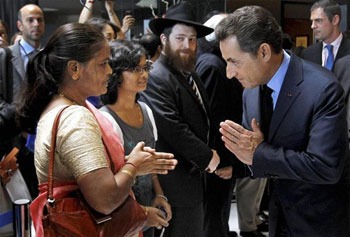 MUMBAI, Dec 7: Shedding the niceties of protocol, the president of France on Tuesday described terrorist groups like the Taliban and al-Qaida as savages who claim to serve the ideal of religion and nationhood. Calling Pakistan the melting pot of terror, Nicolas Sarkozy repeatedly said it was unacceptable the way that country was subverting the security of India as well as Afghanistan.
MUMBAI, Dec 7: Shedding the niceties of protocol, the president of France on Tuesday described terrorist groups like the Taliban and al-Qaida as savages who claim to serve the ideal of religion and nationhood. Calling Pakistan the melting pot of terror, Nicolas Sarkozy repeatedly said it was unacceptable the way that country was subverting the security of India as well as Afghanistan. 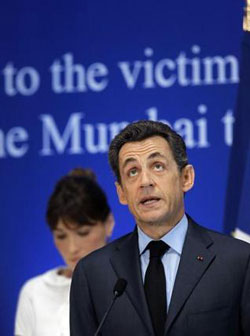 MUMBAI, Dec 7: French President Nicolas Sarkozy has said on Tuesday that it was "unacceptable" that terror networks could find "safe havens" in Pakistan, as he paid tribute to victims of the November 2008 Mumbai attacks. He said that the Taliban and Al-Qaeda were able to find "safe havens" in the frontier areas of Pakistan.
MUMBAI, Dec 7: French President Nicolas Sarkozy has said on Tuesday that it was "unacceptable" that terror networks could find "safe havens" in Pakistan, as he paid tribute to victims of the November 2008 Mumbai attacks. He said that the Taliban and Al-Qaeda were able to find "safe havens" in the frontier areas of Pakistan.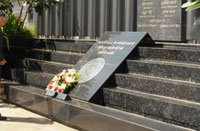 Sarkozy also observed one-minute silence remembering the martyrs.
Sarkozy also observed one-minute silence remembering the martyrs.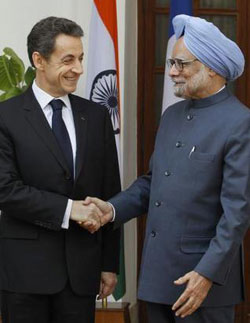 NEW DELHI, Dec 6: French President Nicolas Sarkozy has indicated that India would become permanent member of United Nations Security Council in two years. India was recently elected as a non-permanent member of the Security Council from January 1, 2011 for a two-year term and, therefore, 2013 should see India’s status change from non-permanent to Permanent member of the Security Council.
NEW DELHI, Dec 6: French President Nicolas Sarkozy has indicated that India would become permanent member of United Nations Security Council in two years. India was recently elected as a non-permanent member of the Security Council from January 1, 2011 for a two-year term and, therefore, 2013 should see India’s status change from non-permanent to Permanent member of the Security Council.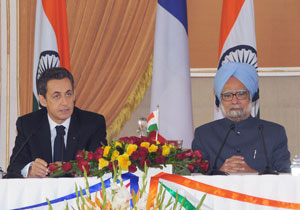 He reiterated that it was unfair that a country of one billion should be kept out of the UNSC high table.
He reiterated that it was unfair that a country of one billion should be kept out of the UNSC high table. Dr. Singh and Sarkozy held extensive talks on a host of issues like enhancement of bilateral ties in a wide range of areas such as defence, counter-terrorism, space, science and technology besides discussing the situation in Afghanistan and Pakistan.
Dr. Singh and Sarkozy held extensive talks on a host of issues like enhancement of bilateral ties in a wide range of areas such as defence, counter-terrorism, space, science and technology besides discussing the situation in Afghanistan and Pakistan.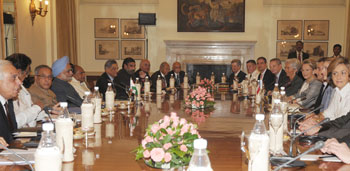 The key agreement was on construction of two 1650 MW nuclear power reactors in Jaitapur in Maharashtra, which marks the first such plant to be set up in India after the Nuclear Suppliers Group ended New Delhi's isolation in the field in 2008.
The key agreement was on construction of two 1650 MW nuclear power reactors in Jaitapur in Maharashtra, which marks the first such plant to be set up in India after the Nuclear Suppliers Group ended New Delhi's isolation in the field in 2008. However, operationalisation of the agreement will take some time as negotiations on technical issues like pricing are still underway.
However, operationalisation of the agreement will take some time as negotiations on technical issues like pricing are still underway.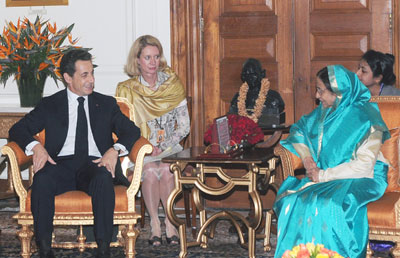 The two reactors of Jaitapur would be built at a cost of 7 billion Euros and will have guaranteed fuel supply from France for 25 years.
The two reactors of Jaitapur would be built at a cost of 7 billion Euros and will have guaranteed fuel supply from France for 25 years.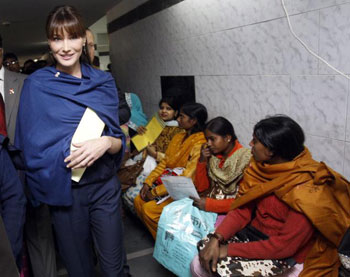 NEW DELHI, Dec 6: Global gay rights and AIDS activism got a fillip on Monday with French First Lady Carla Bruni making more than a fashion statement by meeting HIV positive mothers, children and activists.
NEW DELHI, Dec 6: Global gay rights and AIDS activism got a fillip on Monday with French First Lady Carla Bruni making more than a fashion statement by meeting HIV positive mothers, children and activists.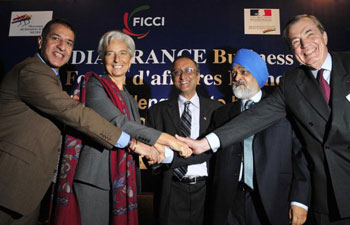 NEW DELHI, Dec 6: The French Finance Minister emphasised on opening up sectors like insurance and retail, particularly, multi-brand retail, so that French companies can invest in these sectors
NEW DELHI, Dec 6: The French Finance Minister emphasised on opening up sectors like insurance and retail, particularly, multi-brand retail, so that French companies can invest in these sectors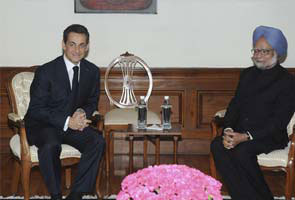 NEW DELHI, Dec 5: Indian Prime Minister Manmohan Singh Sunday hosted a private dinner for visiting French President Nicolas Sarkozy and allayed his concerns over India's civil nuclear liability law, brightening the possibility of a framework civil nuclear accord being signed.
NEW DELHI, Dec 5: Indian Prime Minister Manmohan Singh Sunday hosted a private dinner for visiting French President Nicolas Sarkozy and allayed his concerns over India's civil nuclear liability law, brightening the possibility of a framework civil nuclear accord being signed. NEW DELHI, Dec 5: Rights of HIV/AIDS patients was the topic of discussion when French First Lady Carla Bruni met UPA Chairperson Sonia Gandhi at a dinner hosted by Prime Minister Manmohan Singh here on Sunday night.
NEW DELHI, Dec 5: Rights of HIV/AIDS patients was the topic of discussion when French First Lady Carla Bruni met UPA Chairperson Sonia Gandhi at a dinner hosted by Prime Minister Manmohan Singh here on Sunday night. 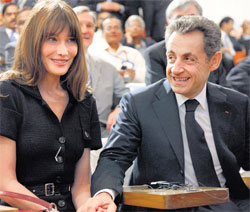 BANGALORE, Dec 4: French President Nicolas Sarkozy has endorsing India’s entry into the Nuclear Suppliers Group (NSG) and its case for a permanent membership of the expanded United Nations Security Council, saying it was "unthinkable" to keep a country of over one billion out.
BANGALORE, Dec 4: French President Nicolas Sarkozy has endorsing India’s entry into the Nuclear Suppliers Group (NSG) and its case for a permanent membership of the expanded United Nations Security Council, saying it was "unthinkable" to keep a country of over one billion out. 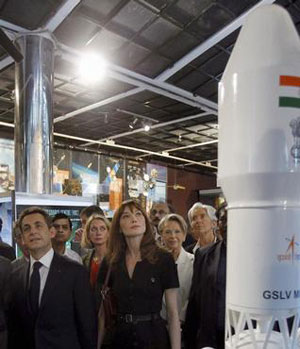 Supporting India’s bid for a permanent seat at the United Nation’s Security Council (UNSC), Sarkozy said it was unthinkable to imagine that 1.1 billion people were not represented in the UNSC.
Supporting India’s bid for a permanent seat at the United Nation’s Security Council (UNSC), Sarkozy said it was unthinkable to imagine that 1.1 billion people were not represented in the UNSC. 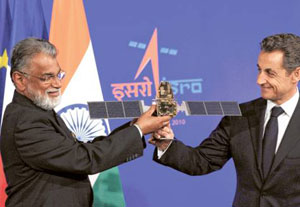 BANGALORE, Dec 4: Indian Space Research Organisation has given an estimated Rs 500 crore order to Arianespace and renewed the five-year contract with EADS Astrium for joint marketing of satellites.
BANGALORE, Dec 4: Indian Space Research Organisation has given an estimated Rs 500 crore order to Arianespace and renewed the five-year contract with EADS Astrium for joint marketing of satellites. NEW DELHI, Dec 1: French President Nicolas Sarkozy’s visit to India this week will provide further momentum to the growing Indo-French ties and strategic partnership, according to a spokesman of the Ministry of External Affairs.
NEW DELHI, Dec 1: French President Nicolas Sarkozy’s visit to India this week will provide further momentum to the growing Indo-French ties and strategic partnership, according to a spokesman of the Ministry of External Affairs. December 5 is reserved for a private visit to Agra where France’s first couple will see the Taj Mahal.
December 5 is reserved for a private visit to Agra where France’s first couple will see the Taj Mahal. 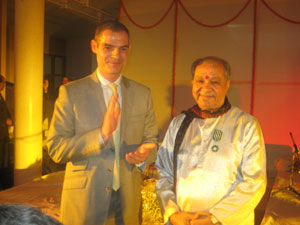 NEW DELHI, Nov 9: The Ambassador of France to India, Mr Jérôme Bonnafont, conferred the distinction of Chevalier dans l'Ordre des Arts et des Lettres on Classical flute exponent Pandit Hariprasad Chaurasia here on Tuesday.
NEW DELHI, Nov 9: The Ambassador of France to India, Mr Jérôme Bonnafont, conferred the distinction of Chevalier dans l'Ordre des Arts et des Lettres on Classical flute exponent Pandit Hariprasad Chaurasia here on Tuesday. 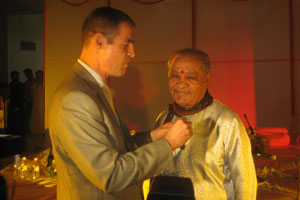 Pandit Chaurasia is also artistic director of the Indian music department at Rotterdam Music Conservatory, where he has been teaching for the past 15 years.
Pandit Chaurasia is also artistic director of the Indian music department at Rotterdam Music Conservatory, where he has been teaching for the past 15 years. 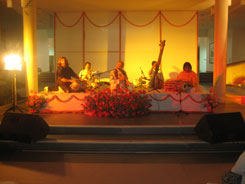
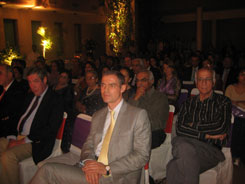
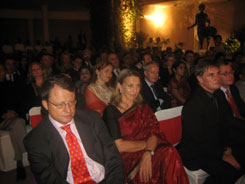
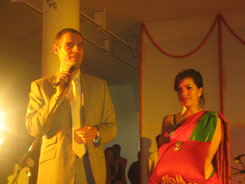
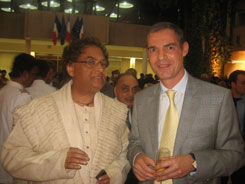
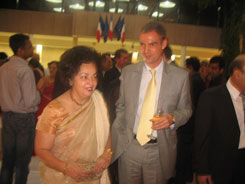
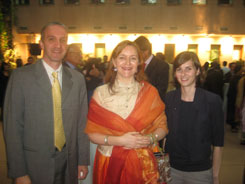
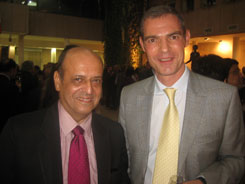
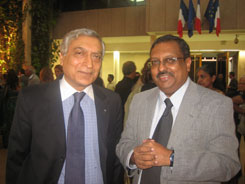
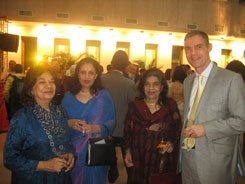
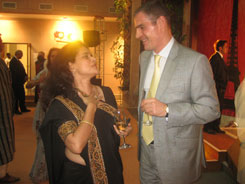
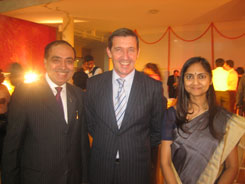
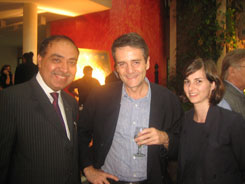
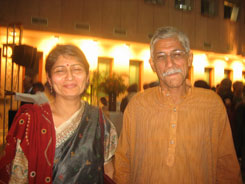
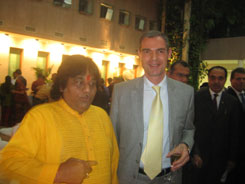
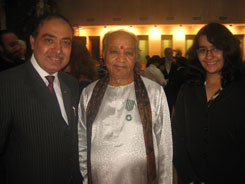
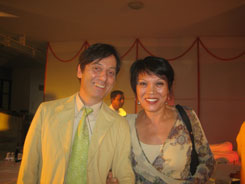
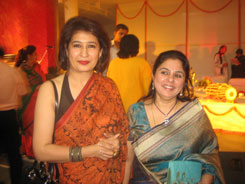
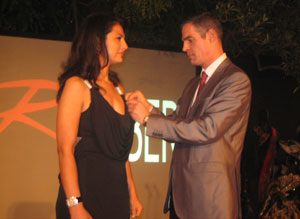 NEW DELHI, Oct 21: The Ambassador of France to India, Mr Jérôme Bonnafont, bestowed the award of Chevalier dans l'Ordre des Arts et des Lettres (Knight of the Order of Arts and Letters) on Indian fashion designer Ritu Beri here at an elegant and grand ceremony.
NEW DELHI, Oct 21: The Ambassador of France to India, Mr Jérôme Bonnafont, bestowed the award of Chevalier dans l'Ordre des Arts et des Lettres (Knight of the Order of Arts and Letters) on Indian fashion designer Ritu Beri here at an elegant and grand ceremony. 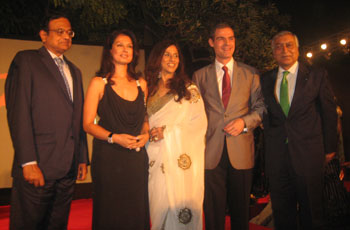 Speaking at the ceremony at the French Residence, Ambassador Bonnafont said that Beri was not just a "celebrated designer in France" but also a "link between India and France”.
Speaking at the ceremony at the French Residence, Ambassador Bonnafont said that Beri was not just a "celebrated designer in France" but also a "link between India and France”. 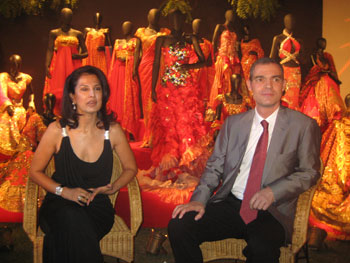 The Ambassador said "we see Ritu as a link between the two countries. By conferring this award upon Ritu, we also see it as a way to enhance the cultural relationship between India and France."
The Ambassador said "we see Ritu as a link between the two countries. By conferring this award upon Ritu, we also see it as a way to enhance the cultural relationship between India and France."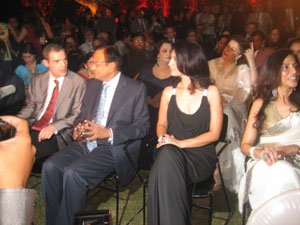 Mr Chidambaram said "when we were a closed economy we did not think much of the world and the world did not think much of us. When we opened the economy to the world we were also opening the talents of the Indian people. Ritu Beri is one such example...there are hundreds, thousands of such examples in the country."
Mr Chidambaram said "when we were a closed economy we did not think much of the world and the world did not think much of us. When we opened the economy to the world we were also opening the talents of the Indian people. Ritu Beri is one such example...there are hundreds, thousands of such examples in the country."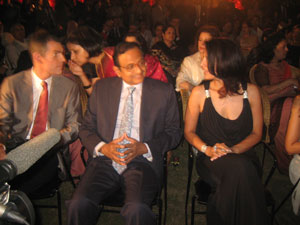 Looking stunning in a black backless dress, Ritu, after receiving the award, said that the award was unexpected and it was her love for India that saw her reach the fashion pinnacle.
Looking stunning in a black backless dress, Ritu, after receiving the award, said that the award was unexpected and it was her love for India that saw her reach the fashion pinnacle.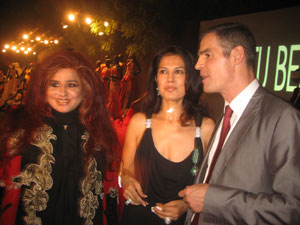 Talking about her special love for Paris, she said “I do believe Paris is my destiny. It was meant for me. Since I was ten, Paris is where I wanted to be."
Talking about her special love for Paris, she said “I do believe Paris is my destiny. It was meant for me. Since I was ten, Paris is where I wanted to be."